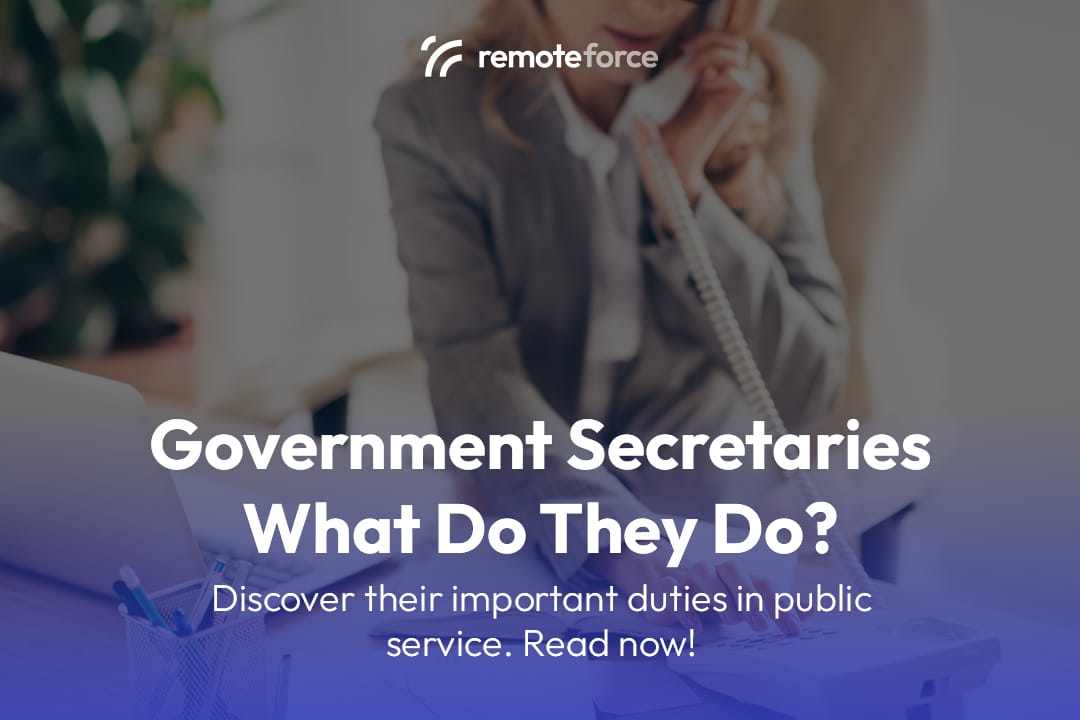When you think of government, images of policy-makers, elected officials, and public servants often come to mind. But behind every successful government office, agency, or department, there’s a vital administrative backbone: the government secretary. Far from a mere administrative support role, a government secretary operates within a complex ecosystem of public policy, legal compliance, and community service, playing a critical role in ensuring governmental operations run smoothly and efficiently.
If you’re exploring careers in public service or seeking to understand the inner workings of government administration, grasping what a government secretary does is essential. This guide will provide a detailed breakdown of their unique and important responsibilities, highlighting their indispensable contribution to public administration and policy implementation.
Table of Contents
ToggleThe Unique Environment of Government Administration
Working in government presents a distinct set of challenges and requirements compared to the private sector. Government secretaries must navigate:
- Strict Regulations and Protocols: Adherence to highly specific federal, state, or local laws, ethical guidelines, and internal departmental procedures.
- Public Accountability: A strong emphasis on transparency and proper record-keeping, as their work often impacts public services and funds.
- Diverse Stakeholders: Interacting with citizens, elected officials, various government departments, non-profit organizations, and private contractors.
- Confidentiality and Security: Handling sensitive information related to national security, citizen data, or ongoing investigations with the utmost discretion.
These factors elevate the role of a government secretary beyond typical administrative support, demanding a unique blend of skills and a deep understanding of public sector operations.
Key Responsibilities of a Government Secretary

Let’s delve into the important and often specialized duties that define the role of a government secretary.
1. Public Records Management and Information Control
A core responsibility is the meticulous management of public and official records.
- Document Lifecycle Management: Creating, organizing, maintaining, and archiving vast quantities of official documents, including policy papers, legislative drafts, meeting minutes, public inquiries, and internal memos. This involves adherence to specific government record-keeping standards (e.g., FOIA compliance in the U.S.).
- Information Dissemination: Ensuring that public information is accessible and distributed in accordance with government transparency laws and internal protocols. This can include preparing information packets for public release or managing departmental websites.
- Sensitive Data Handling: Securely managing classified or confidential government information, requiring knowledge of data protection laws and security clearances.
Real-World Scenario: A secretary in a local planning department might be responsible for maintaining meticulous records of zoning applications, public hearing transcripts, and building permits, ensuring they are accurately filed and easily retrievable for both internal review and public requests.
2. Policy Implementation and Procedural Adherence
Government secretaries play a vital role in the practical application of policies and regulations.
- Procedural Compliance: Ensuring all administrative processes comply with governmental laws, regulations, and departmental standard operating procedures (SOPs).
- Policy Support: Assisting in the preparation and distribution of policy documents, ensuring that all relevant staff are informed of updates and changes.
- Legislative Tracking (Advanced): For secretaries working with legislative bodies, this may involve tracking the progress of bills, preparing summaries, and coordinating communications related to new laws or regulations.
Expert Insight: “A government secretary isn’t just following rules; they’re often ensuring the integrity of public service by upholding regulatory frameworks,” notes a veteran public administrator. “Their attention to detail directly impacts how policies translate into actionable public services.”
3. High-Level Administrative Coordination
Beyond general administrative tasks, government secretaries manage complex schedules and logistics for public officials.
- Complex Calendar Management: Orchestrating intricate schedules for government officials, which may include legislative sessions, committee meetings, public appearances, constituent engagements, and inter-departmental collaborations.
- Travel and Logistics: Arranging official travel, often involving complex security protocols and adherence to government travel guidelines.
- Meeting Preparation for Official Engagements: Preparing comprehensive briefing materials, agendas, and minutes for high-level meetings, including Cabinet meetings, legislative sessions, or inter-agency discussions.
- Stakeholder Coordination: Liaising with representatives from other government agencies, non-profit organizations, community groups, and private sector partners.
4. Public and Constituent Communication
Government secretaries are often the direct point of contact for the public, requiring exceptional communication skills.
- Constituent Relations: Handling inquiries from the public, directing citizens to appropriate resources, or drafting responses on behalf of officials.
- Official Correspondence: Preparing and managing official communications, ensuring they are formal, precise, and adhere to government communication standards.
- Managing Public Feedback: Assisting in the collection and organization of public feedback on policies or services.
5. Budget and Procurement Support
While not always directly managing budgets, they often play a crucial support role.
- Expense Tracking and Reporting: Meticulously tracking departmental expenses and preparing reports in compliance with public financial regulations.
- Procurement Assistance: Assisting with the procurement process by preparing requisitions, tracking orders, and managing vendor communications, all while adhering to government procurement rules.
- Grant Application Support: For certain departments, assisting in the administrative aspects of preparing grant applications or reports.
6. Specialized Knowledge and Compliance
Depending on the specific government entity, secretaries may require unique specialized knowledge.
- Legal/Judicial Systems: Secretaries in courts or legal departments need a deep understanding of legal terminology and court procedures.
- Healthcare Regulations: Those in health departments must be familiar with medical terminology and healthcare policies.
- Security Clearances: Many roles, particularly in defense, intelligence, or high-level executive offices, require various levels of security clearance.
Must-Have Skills for a Government Secretary
To thrive in this specialized role, a government secretary needs:
- Meticulous Attention to Detail: Essential for managing public records and adhering to strict legal and procedural requirements.
- Strong Ethical Compass and Integrity: Crucial for handling public funds and confidential information.
- Knowledge of Government Operations: Understanding the structure, departments, and specific laws relevant to their agency.
- Excellent Written and Verbal Communication: Ability to communicate clearly, formally, and diplomatically with diverse audiences, including the public and high-ranking officials.
- Advanced Organizational and Time Management Skills: For managing high volumes of documents, complex schedules, and numerous deadlines.
- Proficiency in Government-Specific Software: Often involves learning bespoke government systems alongside standard office suites.
- Discretion and Confidentiality: Absolutely vital given the sensitive nature of government work.
Conclusion: The Unsung Architects of Public Service
What does a government secretary do? They are the highly specialized, detail-oriented, and ethically driven professionals who ensure the machinery of government runs smoothly. Their responsibilities span critical areas from public records management and policy implementation to high-level administrative coordination and citizen communication. They are indispensable to maintaining public trust, upholding regulatory standards, and delivering essential services to communities.
If your government agency or public sector organization needs meticulous administrative support that understands the nuances of public operations, compliance, and confidentiality, choosing the right partner is paramount. At RemoteForce, we specialize in connecting organizations with highly skilled and vetted administrative talent, including top-tier secretaries with experience in navigating the complexities of government environments. Our expertise ensures you gain access to professionals who can seamlessly integrate and elevate your administrative functions.
Ready to enhance your public sector efficiency with expert administrative support? Contact RemoteForce today to discover how our secretarial services can empower your government operations!




